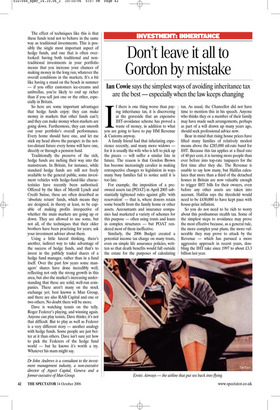Don’t leave it all to Gordon by mistake
Ian Cowie says the simplest ways of avoiding inheritance tax are the best — especially when the law keeps changing If there is one thing worse than paying inheritance tax, it is discovering at the graveside that an expensive IHT-avoidance scheme has proved a waste of money, in addition to what you are going to have to pay HM Revenue & Customs anyway.
A family friend had that infuriating experience recently, and many more widows for it is usually the wife who is left to pick up the pieces — will suffer a similar fate in future. The reason is that Gordon Brown has become increasingly cavalier in making retrospective changes to legislation in ways many busy families fail to notice until it is too late.
For example, the imposition of a preowned assets tax (POAT) in April 2005 substantially tightened rules against gifts ‘with reservation’ — that is, where donors retain some benefit from the family home or other assets. Accountants and insurance companies had marketed a variety of schemes for this purpose — often using trusts and loans in complex structures — but POAT rendered most of them ineffective.
Similarly, the 2006 Budget created a potential income tax charge on many trusts, even on simple life assurance policies, written so that death benefits would fall outside the estate for the purposes of calculating tax. As usual, the Chancellor did not have time to mention this in his speech. Anyone who thinks they or a member of their family may have made such arrangements, perhaps as part of a will drawn up many years ago, should seek professional advice now.
Bear in mind that rising house prices have lifted many families of relatively modest means above the £285,000 nil-rate band for IHT. Because this tax applies at a fixed rate of 40 per cent, it is turning more people than ever before into top-rate taxpayers for the first time after they die. The Revenue is unable to say how many, but Halifax calculates that more than a third of the detached homes in Britain are now valuable enough to trigger IHT bills for their owners, even before any other assets are taken into account. Halifax says the threshold would need to be £430,000 to have kept pace with house-price inflation.
So you do not need to be rich to worry about this posthumous stealth tax. Some of the simplest steps to avoidance may prove the most effective because, as a general rule, the more complex your plans, the more vulnerable they may prove to attack by the Revenue — which has pursued a more aggressive approach in recent years, doubling the IHT take since 1997 to about £3.3 billion last year.


































































































 Previous page
Previous page